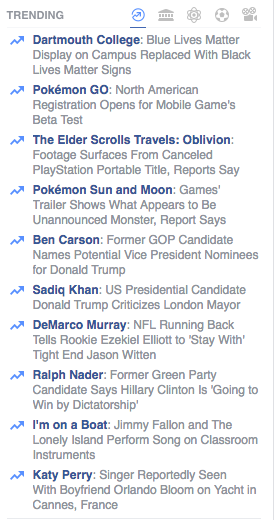Social
Why Facebook’s Trending Topics Scandal Conceals a Bigger Problem
Mark Zuckerberg has made it known he doesn’t like Donald Trump. But on Wednesday, he’s going to have to bend down and kiss the Republican ring.
Facebook has endured some of the most sustained criticism of its lifetime this past week after Gizmodo, the Guardian, and other publications leaked information on the internal process behind Trending Topics, the social network’s column of top news stories that were supposedly representative of the most popular stories of the day.

It was previously assumed that algorithms dictated the topics, but the reality is more complicated. Former employees alleged that Facebook deliberately blacklisted certain topics and sources (namely conservative ones), boosted topics that weren’t actually trending, and asked writers who drafted the blurbs to make some Orwellian language changes, like renaming Twitter and Snapchat “social networks.”
It’s a bad look for Facebook, which has done all it can to retain a neutral reputation—even Mark Zuckerberg’s daily costume of gray shirt, jeans, and running shoes suggests impartiality. The ubiquity of the social network means that it has approached, if not surpassed, Google levels of utility for the average internet user. If Facebook is indeed “eating the internet” like so many headlines have claimed, it needs to be seen as a tool just like web browsers, unswayed by political leanings or business interests.
News complicates that requirement. As the media industry has learned time and time again, maintaining a reputation for objectivity can be a fool’s errand—no matter what you put on the front page, someone somewhere is going to think you’re ignoring the real story.
FB: “Trust us.” Ok. Define “hoax”, “sufficient source”, “coherent”, “effective” & “neutral”. https://t.co/0pGIzQhh9E pic.twitter.com/xWaN0s5P2J
— Zeynep Tufekci (@zeynep) May 10, 2016
Yet Facebook has done all it can in the past couple years to bring the news media onto its platform. The social network controls more than a third of online traffic to publishers, opened Instant Articles last year so more content would live within its walls, and partnered with publishers on big-name initiatives like Facebook Live. Most importantly, the Trending Topics section is essentially Facebook’s version of a front page—in other words, Facebook is a media company as much as it is a tech company, whether it wants to admit it or not.
But Facebook doesn’t want that reputation, which is why the former journalists who leaked the news felt like they were training an algorithm. Algorithms give Facebook a convenient out when it comes to the complications of news. Even though humans ultimately design the algorithms, the company can blame the code if something goes wrong. Humans are messy; code is unbiased, or so we thought.
Eventually, that’s what will happen: Trending Topics will be run entirely by an algorithm that takes into account people’s browsing histories and spits out neutral headlines. By then, this controversy will likely have blown over, conservative talking heads will have found a new target in the liberal media, and Facebook will be just as powerful as before.
Besides, as others have pointed out, the uproar this week may have been misplaced. Users don’t actually look at Trending Topics that often. Before this story broke, many people didn’t even realize the feature existed on the mobile version of Facebook. The News Feed, the nervous system that makes Facebook tick, is really what’s affecting the way people interact with each other and the news.
As analyst Ben Thompson writes, “What is far more damaging—and far more engaging, and thus lucrative for Facebook—is all of us in our own virtual neighborhoods of our own making, liking opinions that tell us we’re right instead of engaging with viewpoints that make us question our assumptions.”
Trending Topics may be biased, but the human element of the selection process at least means we’re seeing stories we may not normally encounter. The echoes of the News Feed, however, fuel a much more potent bias, and they will continue to do so without an ending in sight.
Image by ShutterstockGet better at your job right now.
Read our monthly newsletter to master content marketing. It’s made for marketers, creators, and everyone in between.




